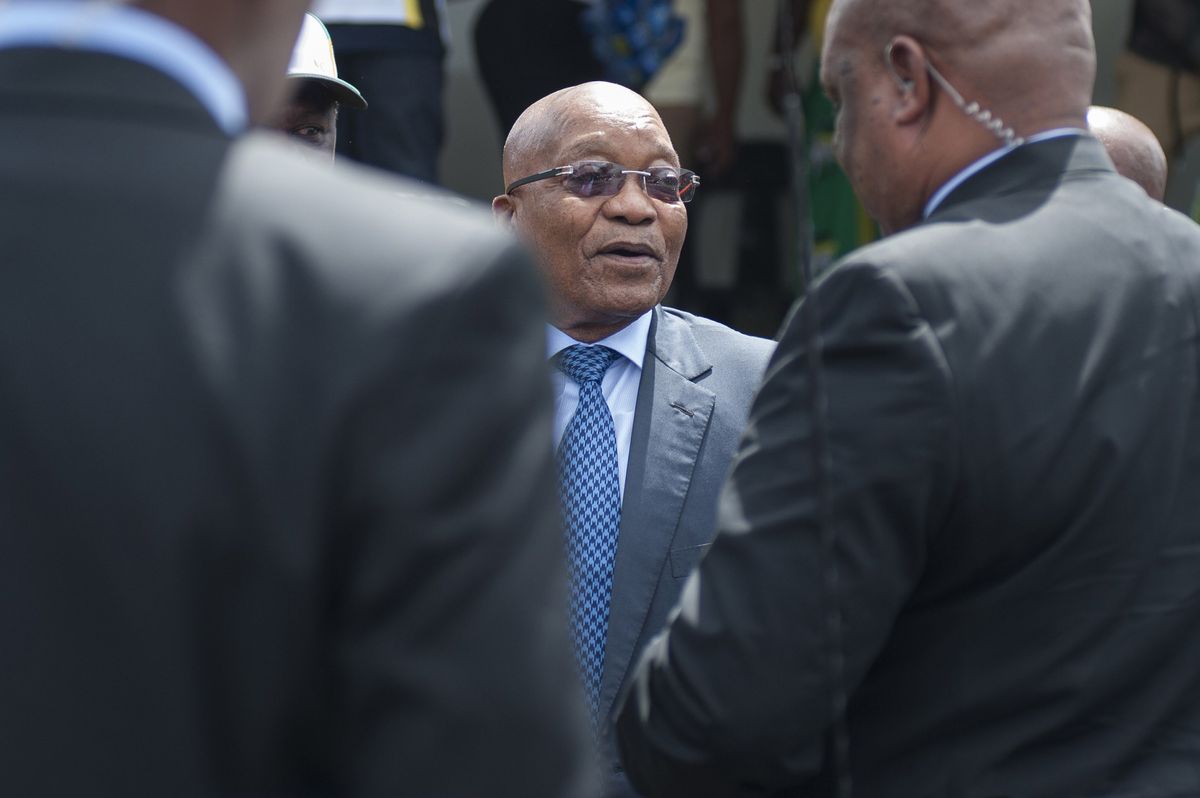Zuma Faces Widening Backlash After South African Cabinet Purge

EghtesadOnline: South African President Jacob Zuma faced a widening public backlash from senior members of the ruling African National Congress including his deputy, Cyril Ramaphosa, after he fired his finance minister and made sweeping cabinet changes.
“I made my views known. There are quite a number of other colleagues and comrades who are unhappy about the situation, particularly the removal of the minister of finance,” Ramaphosa said Friday in remarks released by his office. While he said he wouldn’t resign, he called Zuma’s reasons for removing Pravin Gordhan “unacceptable.”
ANC Secretary-General Gwede Mantashe said Zuma didn’t consult the party’s top six leaders about most of the cabinet changes, saying a list of nominees “was thrown at us.” The party’s chief whip in parliament, Jackson Mthembu, said he opposed the removal of Gordhan and his deputy, Mcebisi Jonas. “Their crime is incorruptibility. We stand with them,” he said in a post on Twitter.
According to Bloomberg, Zuma’s decision to fire Pravin Gordhan, with whom he feuded over control of state finances, brought to the open South Africa’s biggest political crisis in almost a decade. While a group of party veterans accused Zuma of undermining the 105-year-old ANC, opposition parties are pushing for his ouster in parliament and several public protests were held. South African bank stocks tumbled and bonds plunged as the rand headed for its biggest weekly slide since 2015.
“Zuma’s actions are compelling some people within the ANC who have been standing on the sidelines to take action,” said Ongama Mtimka, a political science lecturer at the Nelson Mandela Metropolitan University in the city of Port Elizabeth. “If it was unthinkable about five or six months ago that there may be a parliamentary coup; I think the time will be ripe for that.”
The rand tumbled, weakening as much as 2.6 percent against the dollar and was at 13.3680 at 4:37 p.m. in Johannesburg on Friday. It has plunged 7 percent this week, the most of more than 140 currencies tracked by Bloomberg. Yields on benchmark rand-denominated government bonds due December 2026 climbed 34 basis points on Friday to 8.84 percent.
Zuma’s Exit
The cabinet changes come just nine months before Zuma is due to step down as ANC leader, and exactly a year after the nation’s top court found that he violated his oath of office when he refused to repay taxpayer funds spent on his private home. His second and final term as the nation’s president is due to end in 2019.
“One way or another, Zuma will soon exit South Africa’s political scene,” said Phoenix Kalen, director of emerging-market strategy at Societe Generale SA in London. The cabinet reshuffle “may have accelerated his own political demise,” she said.
The most vehement criticism of the Zuma’s action from within the ANC’s senior leadership came from Ramaphosa, who’s seen as a top contender to become the party’s next leader. His main rival is Nkosazana Dlamini-Zuma, the former head of the African Union Commission and the president’s ex-wife.
“Unsubstantiated Allegations”
Ramaphosa described an intelligence report that Zuma said showed Gordhan was trying to undermine his government as “unsubstantiated allegations” and said the former finance minister “served our country with such distinction.” Zuma told his party’s leaders that Gordhan was divisive in the cabinet and blocked other ministers’ projects, according to a person with knowledge of their meeting.
Zuma replaced Gordhan with Home Affairs Minister Malusi Gigaba, 45, who has no financial or business experience.
Gordhan, 67, has been at loggerheads with Zuma, 74, for months over plans to build new nuclear plants and the management of state-owned companies. The former finance chief also came under pressure from members of the Gupta family, who are friends of the president, to intervene after the nation’s biggest banks shut their company accounts.
Another victim was Deputy Finance Minister Jonas, who said the Guptas offered to pay him 600,000 rand ($44,522) in cash and deposit 600 million rand into his account if he took up the family’s offer to become finance minister and remove key Treasury officials who were thwarting their business ambitions. The Guptas deny the allegation.
Banks Protest
For now, Zuma is safe. While the ANC can place pressure on him to resign, only Parliament can force him to do so. While the legislature is in recess until the end of next month, the EFF has petitioned Speaker Baleka Mbete, a close Zuma ally and ANC chairwoman, to recall lawmakers next week to debate a motion of no confidence in him.
The ANC has used its 62 percent majority in the 400-seat National Assembly to block four motions of no-confidence, which require a simple majority to pass, and one impeachment attempt filed by the opposition since Zuma took office in May 2009. It’s been comfortably the biggest party in South Africa since the end of apartheid in 1994.
An unintended consequence of Zuma’s actions may be to strengthen South Africa’s democracy, according to Robert Schrire, a political science professor at the University of Cape Town.
“Today we are more likely to see a severely wounded and divided party which may create new opportunities for genuine democracy and political realignments,” he said. “Zuma has reasserted control over his cabinet, but he has been weakened in all the other concentric circles of power: the ANC, business, the public and the global community. ”


